Consumer Psychology Brand Audit: Toyota Corolla - 2004MKT Report
VerifiedAdded on 2023/04/21
|12
|3914
|131
Report
AI Summary
This report provides a detailed brand audit of the Toyota Corolla, focusing on consumer psychology and buyer behavior within the Australian market. It analyzes consumer decision-making processes, applying theories such as Maslow's hierarchy of needs and psychoanalytic theory to explain consumer motivations and attitudes towards the brand. The report explores problem recognition, information search, evaluation of alternatives, purchase behavior, and post-purchase behavior, considering factors like personality traits and consumer beliefs. It also delves into the brand's sustainability and corporate social responsibility efforts, emphasizing Toyota's commitment to environmental conservation through hybrid vehicles and sustainable manufacturing practices. Additionally, the report includes a competitor analysis, comparing the Toyota Corolla with Honda Civic and Hyundai i30, and offering future recommendations for the brand's marketing strategies and positioning.
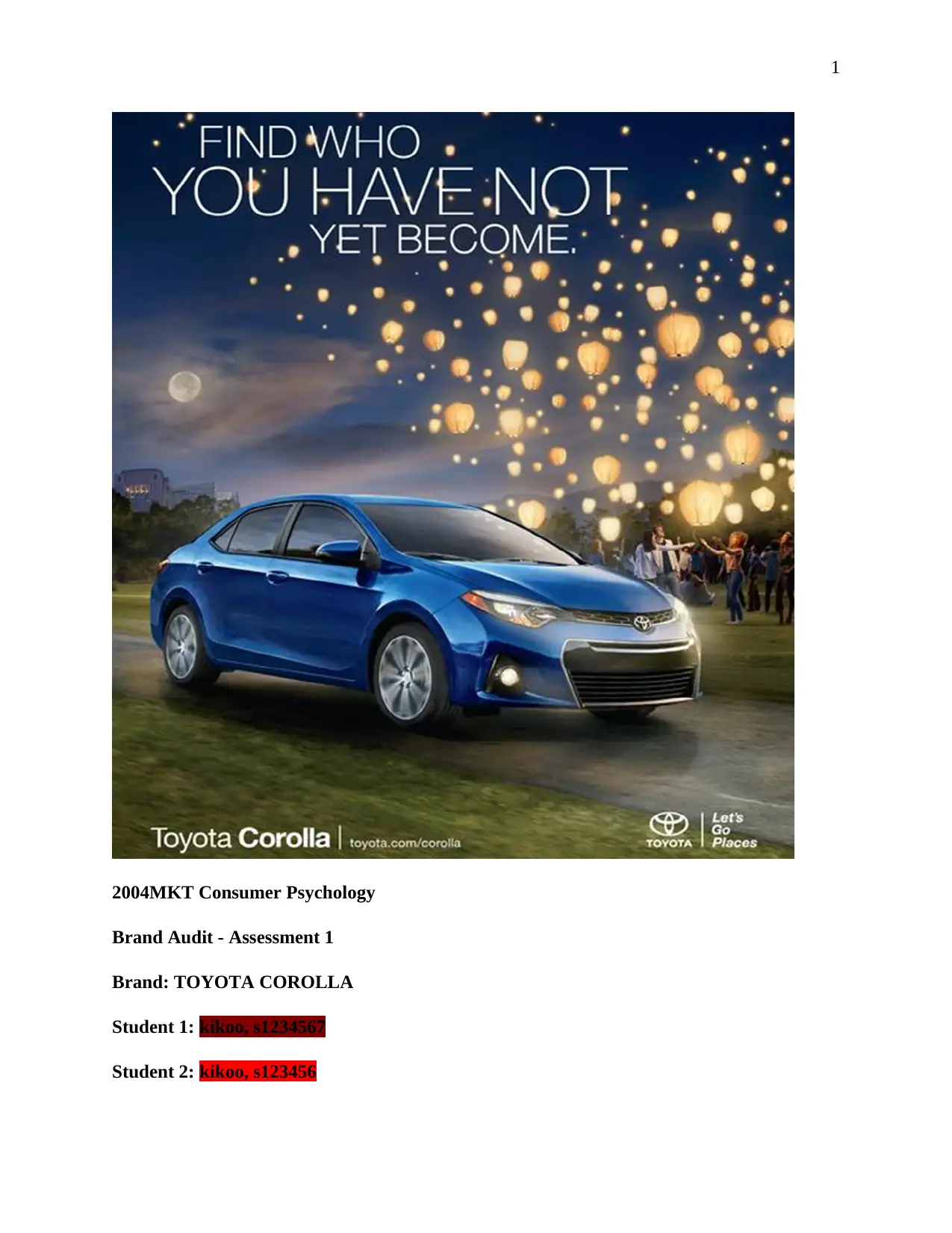
1
2004MKT Consumer Psychology
Brand Audit - Assessment 1
Brand: TOYOTA COROLLA
Student 1: kikoo, s1234567
Student 2: kikoo, s123456
2004MKT Consumer Psychology
Brand Audit - Assessment 1
Brand: TOYOTA COROLLA
Student 1: kikoo, s1234567
Student 2: kikoo, s123456
Paraphrase This Document
Need a fresh take? Get an instant paraphrase of this document with our AI Paraphraser
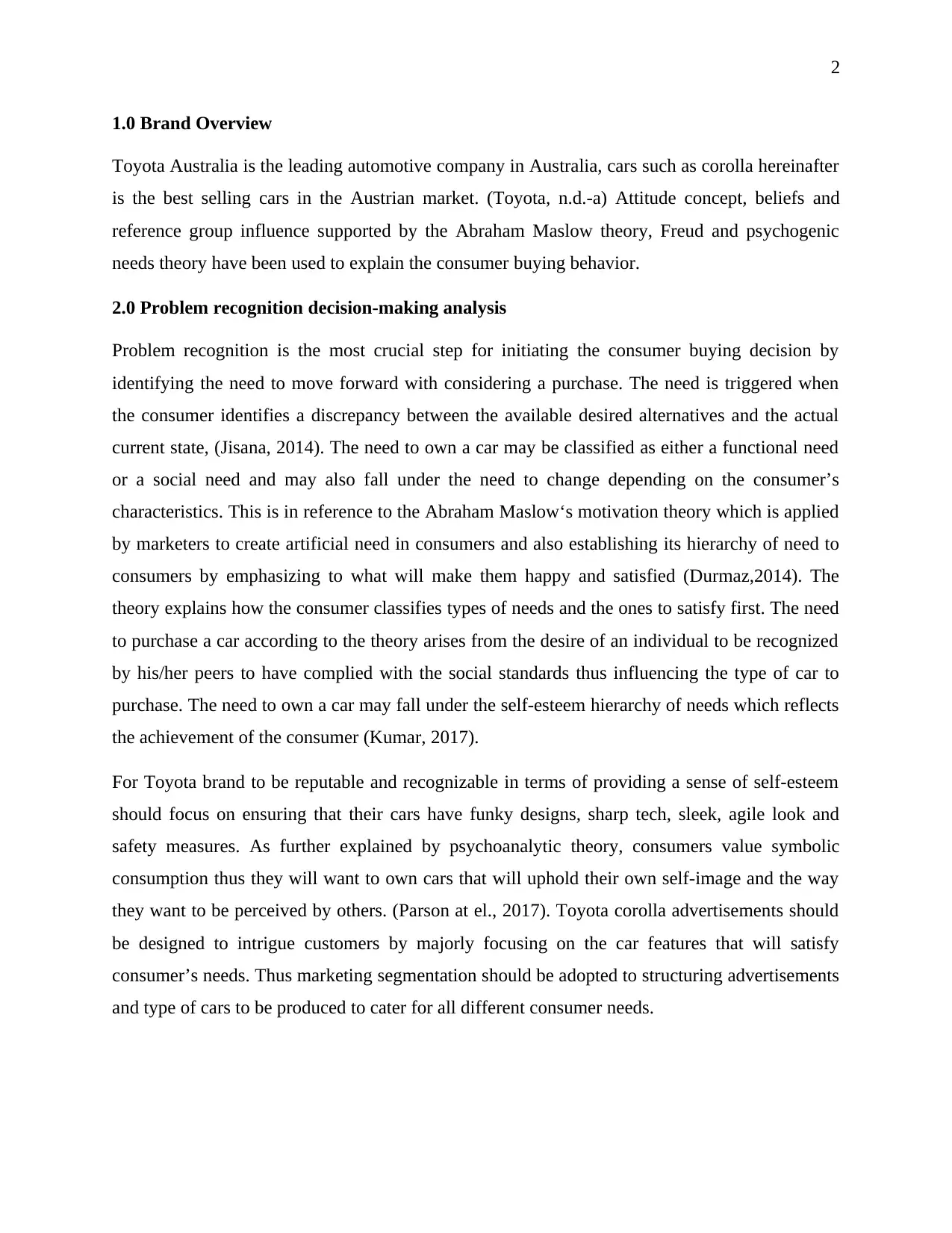
2
1.0 Brand Overview
Toyota Australia is the leading automotive company in Australia, cars such as corolla hereinafter
is the best selling cars in the Austrian market. (Toyota, n.d.-a) Attitude concept, beliefs and
reference group influence supported by the Abraham Maslow theory, Freud and psychogenic
needs theory have been used to explain the consumer buying behavior.
2.0 Problem recognition decision-making analysis
Problem recognition is the most crucial step for initiating the consumer buying decision by
identifying the need to move forward with considering a purchase. The need is triggered when
the consumer identifies a discrepancy between the available desired alternatives and the actual
current state, (Jisana, 2014). The need to own a car may be classified as either a functional need
or a social need and may also fall under the need to change depending on the consumer’s
characteristics. This is in reference to the Abraham Maslow‘s motivation theory which is applied
by marketers to create artificial need in consumers and also establishing its hierarchy of need to
consumers by emphasizing to what will make them happy and satisfied (Durmaz,2014). The
theory explains how the consumer classifies types of needs and the ones to satisfy first. The need
to purchase a car according to the theory arises from the desire of an individual to be recognized
by his/her peers to have complied with the social standards thus influencing the type of car to
purchase. The need to own a car may fall under the self-esteem hierarchy of needs which reflects
the achievement of the consumer (Kumar, 2017).
For Toyota brand to be reputable and recognizable in terms of providing a sense of self-esteem
should focus on ensuring that their cars have funky designs, sharp tech, sleek, agile look and
safety measures. As further explained by psychoanalytic theory, consumers value symbolic
consumption thus they will want to own cars that will uphold their own self-image and the way
they want to be perceived by others. (Parson at el., 2017). Toyota corolla advertisements should
be designed to intrigue customers by majorly focusing on the car features that will satisfy
consumer’s needs. Thus marketing segmentation should be adopted to structuring advertisements
and type of cars to be produced to cater for all different consumer needs.
1.0 Brand Overview
Toyota Australia is the leading automotive company in Australia, cars such as corolla hereinafter
is the best selling cars in the Austrian market. (Toyota, n.d.-a) Attitude concept, beliefs and
reference group influence supported by the Abraham Maslow theory, Freud and psychogenic
needs theory have been used to explain the consumer buying behavior.
2.0 Problem recognition decision-making analysis
Problem recognition is the most crucial step for initiating the consumer buying decision by
identifying the need to move forward with considering a purchase. The need is triggered when
the consumer identifies a discrepancy between the available desired alternatives and the actual
current state, (Jisana, 2014). The need to own a car may be classified as either a functional need
or a social need and may also fall under the need to change depending on the consumer’s
characteristics. This is in reference to the Abraham Maslow‘s motivation theory which is applied
by marketers to create artificial need in consumers and also establishing its hierarchy of need to
consumers by emphasizing to what will make them happy and satisfied (Durmaz,2014). The
theory explains how the consumer classifies types of needs and the ones to satisfy first. The need
to purchase a car according to the theory arises from the desire of an individual to be recognized
by his/her peers to have complied with the social standards thus influencing the type of car to
purchase. The need to own a car may fall under the self-esteem hierarchy of needs which reflects
the achievement of the consumer (Kumar, 2017).
For Toyota brand to be reputable and recognizable in terms of providing a sense of self-esteem
should focus on ensuring that their cars have funky designs, sharp tech, sleek, agile look and
safety measures. As further explained by psychoanalytic theory, consumers value symbolic
consumption thus they will want to own cars that will uphold their own self-image and the way
they want to be perceived by others. (Parson at el., 2017). Toyota corolla advertisements should
be designed to intrigue customers by majorly focusing on the car features that will satisfy
consumer’s needs. Thus marketing segmentation should be adopted to structuring advertisements
and type of cars to be produced to cater for all different consumer needs.
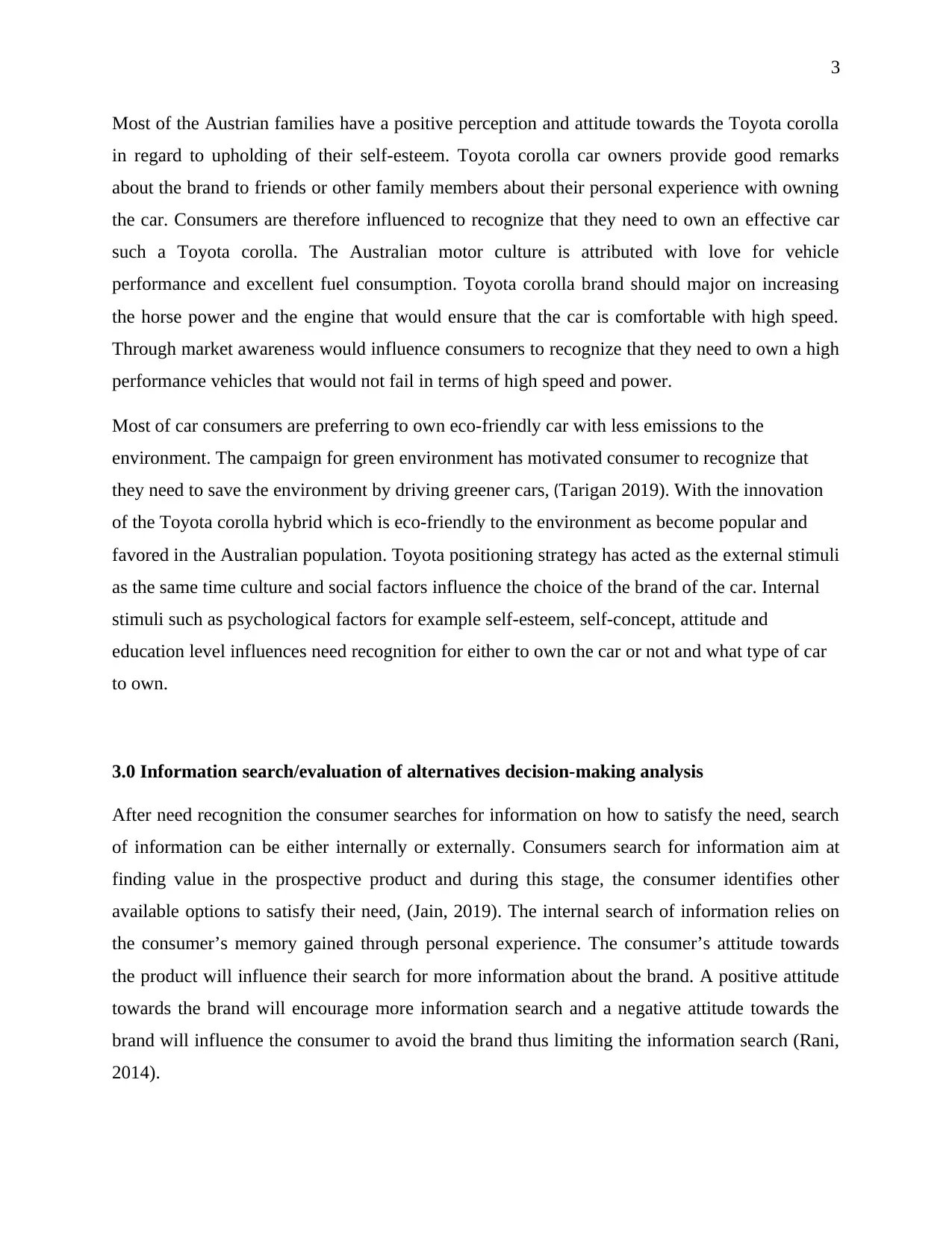
3
Most of the Austrian families have a positive perception and attitude towards the Toyota corolla
in regard to upholding of their self-esteem. Toyota corolla car owners provide good remarks
about the brand to friends or other family members about their personal experience with owning
the car. Consumers are therefore influenced to recognize that they need to own an effective car
such a Toyota corolla. The Australian motor culture is attributed with love for vehicle
performance and excellent fuel consumption. Toyota corolla brand should major on increasing
the horse power and the engine that would ensure that the car is comfortable with high speed.
Through market awareness would influence consumers to recognize that they need to own a high
performance vehicles that would not fail in terms of high speed and power.
Most of car consumers are preferring to own eco-friendly car with less emissions to the
environment. The campaign for green environment has motivated consumer to recognize that
they need to save the environment by driving greener cars, (Tarigan 2019). With the innovation
of the Toyota corolla hybrid which is eco-friendly to the environment as become popular and
favored in the Australian population. Toyota positioning strategy has acted as the external stimuli
as the same time culture and social factors influence the choice of the brand of the car. Internal
stimuli such as psychological factors for example self-esteem, self-concept, attitude and
education level influences need recognition for either to own the car or not and what type of car
to own.
3.0 Information search/evaluation of alternatives decision-making analysis
After need recognition the consumer searches for information on how to satisfy the need, search
of information can be either internally or externally. Consumers search for information aim at
finding value in the prospective product and during this stage, the consumer identifies other
available options to satisfy their need, (Jain, 2019). The internal search of information relies on
the consumer’s memory gained through personal experience. The consumer’s attitude towards
the product will influence their search for more information about the brand. A positive attitude
towards the brand will encourage more information search and a negative attitude towards the
brand will influence the consumer to avoid the brand thus limiting the information search (Rani,
2014).
Most of the Austrian families have a positive perception and attitude towards the Toyota corolla
in regard to upholding of their self-esteem. Toyota corolla car owners provide good remarks
about the brand to friends or other family members about their personal experience with owning
the car. Consumers are therefore influenced to recognize that they need to own an effective car
such a Toyota corolla. The Australian motor culture is attributed with love for vehicle
performance and excellent fuel consumption. Toyota corolla brand should major on increasing
the horse power and the engine that would ensure that the car is comfortable with high speed.
Through market awareness would influence consumers to recognize that they need to own a high
performance vehicles that would not fail in terms of high speed and power.
Most of car consumers are preferring to own eco-friendly car with less emissions to the
environment. The campaign for green environment has motivated consumer to recognize that
they need to save the environment by driving greener cars, (Tarigan 2019). With the innovation
of the Toyota corolla hybrid which is eco-friendly to the environment as become popular and
favored in the Australian population. Toyota positioning strategy has acted as the external stimuli
as the same time culture and social factors influence the choice of the brand of the car. Internal
stimuli such as psychological factors for example self-esteem, self-concept, attitude and
education level influences need recognition for either to own the car or not and what type of car
to own.
3.0 Information search/evaluation of alternatives decision-making analysis
After need recognition the consumer searches for information on how to satisfy the need, search
of information can be either internally or externally. Consumers search for information aim at
finding value in the prospective product and during this stage, the consumer identifies other
available options to satisfy their need, (Jain, 2019). The internal search of information relies on
the consumer’s memory gained through personal experience. The consumer’s attitude towards
the product will influence their search for more information about the brand. A positive attitude
towards the brand will encourage more information search and a negative attitude towards the
brand will influence the consumer to avoid the brand thus limiting the information search (Rani,
2014).
⊘ This is a preview!⊘
Do you want full access?
Subscribe today to unlock all pages.

Trusted by 1+ million students worldwide
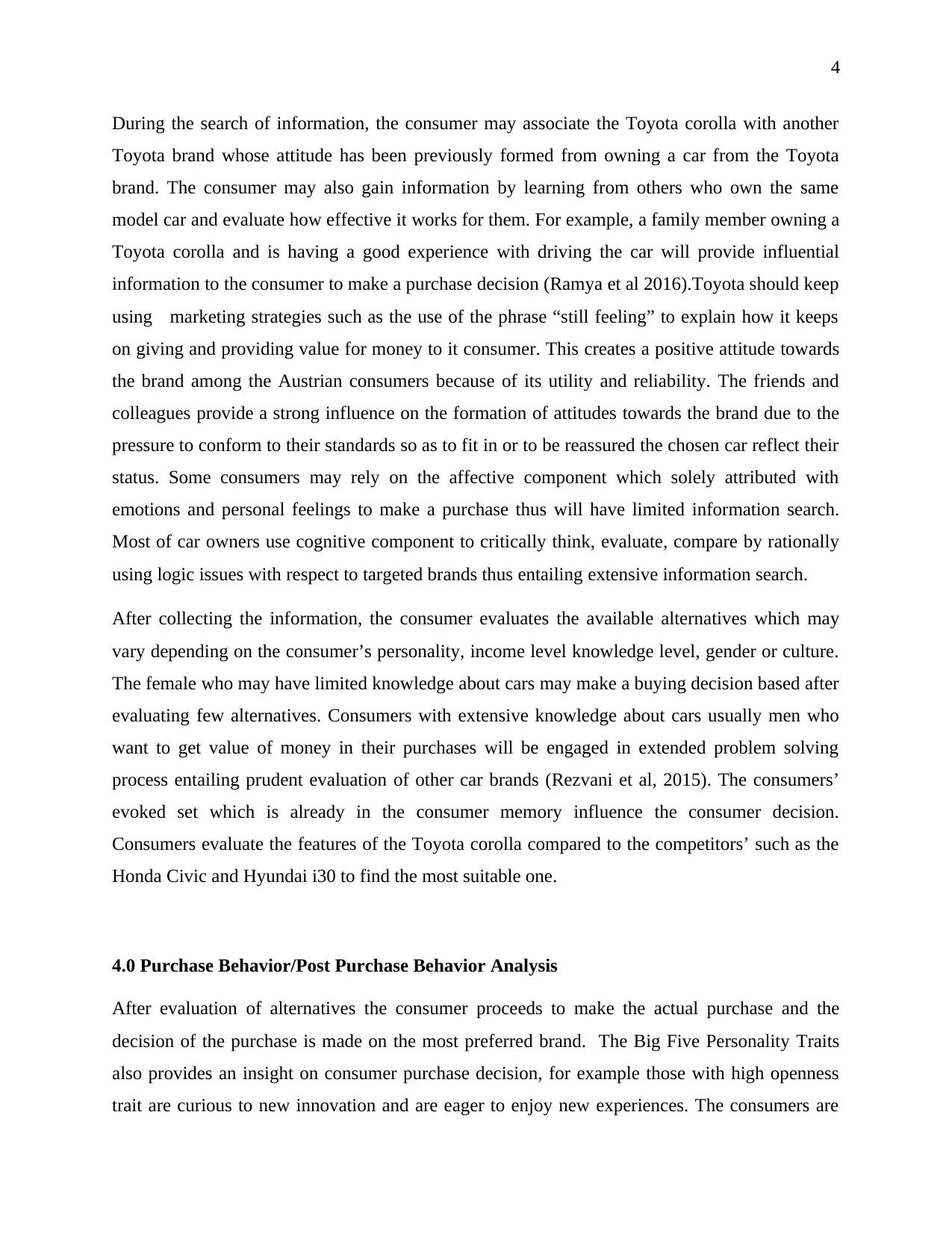
4
During the search of information, the consumer may associate the Toyota corolla with another
Toyota brand whose attitude has been previously formed from owning a car from the Toyota
brand. The consumer may also gain information by learning from others who own the same
model car and evaluate how effective it works for them. For example, a family member owning a
Toyota corolla and is having a good experience with driving the car will provide influential
information to the consumer to make a purchase decision (Ramya et al 2016).Toyota should keep
using marketing strategies such as the use of the phrase “still feeling” to explain how it keeps
on giving and providing value for money to it consumer. This creates a positive attitude towards
the brand among the Austrian consumers because of its utility and reliability. The friends and
colleagues provide a strong influence on the formation of attitudes towards the brand due to the
pressure to conform to their standards so as to fit in or to be reassured the chosen car reflect their
status. Some consumers may rely on the affective component which solely attributed with
emotions and personal feelings to make a purchase thus will have limited information search.
Most of car owners use cognitive component to critically think, evaluate, compare by rationally
using logic issues with respect to targeted brands thus entailing extensive information search.
After collecting the information, the consumer evaluates the available alternatives which may
vary depending on the consumer’s personality, income level knowledge level, gender or culture.
The female who may have limited knowledge about cars may make a buying decision based after
evaluating few alternatives. Consumers with extensive knowledge about cars usually men who
want to get value of money in their purchases will be engaged in extended problem solving
process entailing prudent evaluation of other car brands (Rezvani et al, 2015). The consumers’
evoked set which is already in the consumer memory influence the consumer decision.
Consumers evaluate the features of the Toyota corolla compared to the competitors’ such as the
Honda Civic and Hyundai i30 to find the most suitable one.
4.0 Purchase Behavior/Post Purchase Behavior Analysis
After evaluation of alternatives the consumer proceeds to make the actual purchase and the
decision of the purchase is made on the most preferred brand. The Big Five Personality Traits
also provides an insight on consumer purchase decision, for example those with high openness
trait are curious to new innovation and are eager to enjoy new experiences. The consumers are
During the search of information, the consumer may associate the Toyota corolla with another
Toyota brand whose attitude has been previously formed from owning a car from the Toyota
brand. The consumer may also gain information by learning from others who own the same
model car and evaluate how effective it works for them. For example, a family member owning a
Toyota corolla and is having a good experience with driving the car will provide influential
information to the consumer to make a purchase decision (Ramya et al 2016).Toyota should keep
using marketing strategies such as the use of the phrase “still feeling” to explain how it keeps
on giving and providing value for money to it consumer. This creates a positive attitude towards
the brand among the Austrian consumers because of its utility and reliability. The friends and
colleagues provide a strong influence on the formation of attitudes towards the brand due to the
pressure to conform to their standards so as to fit in or to be reassured the chosen car reflect their
status. Some consumers may rely on the affective component which solely attributed with
emotions and personal feelings to make a purchase thus will have limited information search.
Most of car owners use cognitive component to critically think, evaluate, compare by rationally
using logic issues with respect to targeted brands thus entailing extensive information search.
After collecting the information, the consumer evaluates the available alternatives which may
vary depending on the consumer’s personality, income level knowledge level, gender or culture.
The female who may have limited knowledge about cars may make a buying decision based after
evaluating few alternatives. Consumers with extensive knowledge about cars usually men who
want to get value of money in their purchases will be engaged in extended problem solving
process entailing prudent evaluation of other car brands (Rezvani et al, 2015). The consumers’
evoked set which is already in the consumer memory influence the consumer decision.
Consumers evaluate the features of the Toyota corolla compared to the competitors’ such as the
Honda Civic and Hyundai i30 to find the most suitable one.
4.0 Purchase Behavior/Post Purchase Behavior Analysis
After evaluation of alternatives the consumer proceeds to make the actual purchase and the
decision of the purchase is made on the most preferred brand. The Big Five Personality Traits
also provides an insight on consumer purchase decision, for example those with high openness
trait are curious to new innovation and are eager to enjoy new experiences. The consumers are
Paraphrase This Document
Need a fresh take? Get an instant paraphrase of this document with our AI Paraphraser
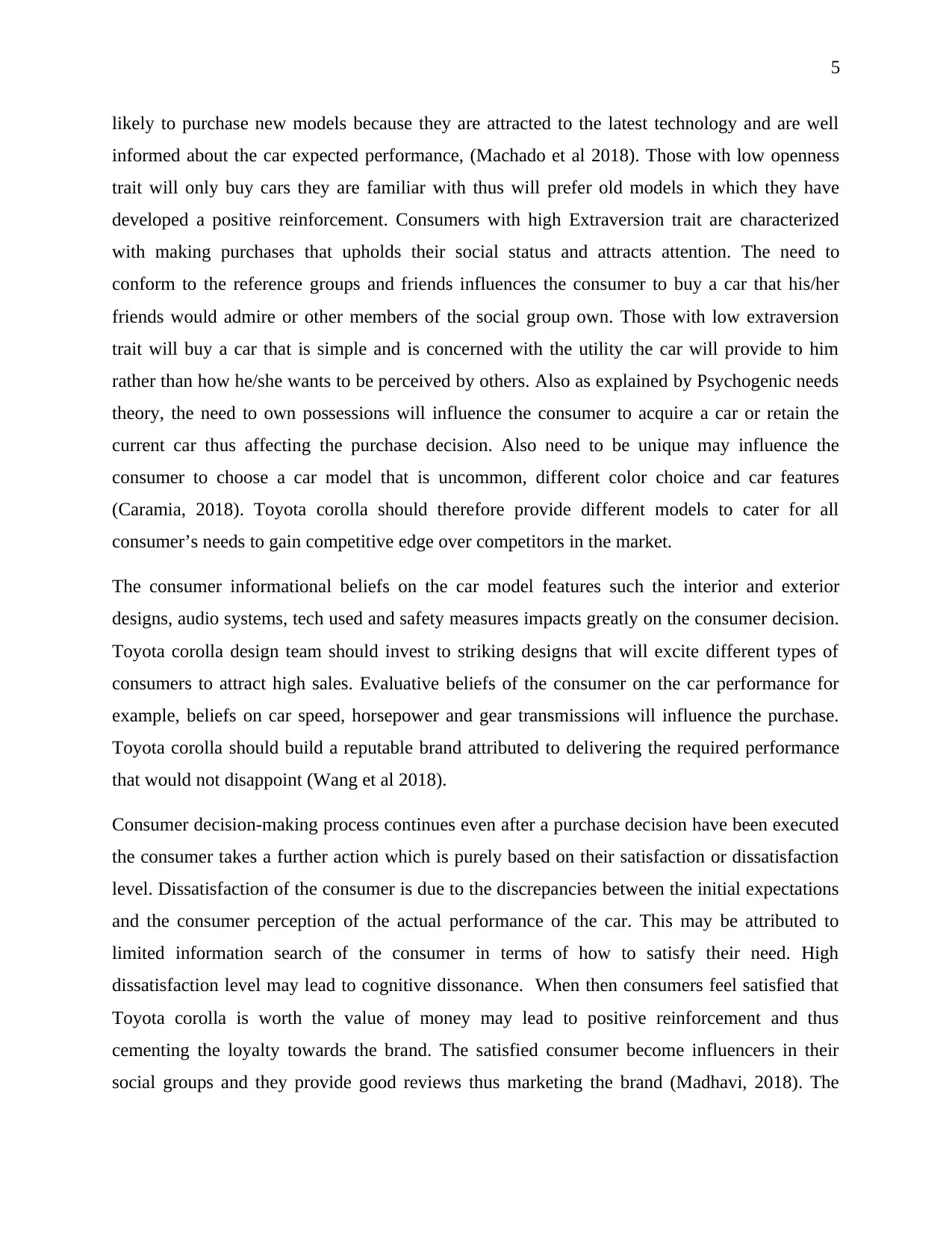
5
likely to purchase new models because they are attracted to the latest technology and are well
informed about the car expected performance, (Machado et al 2018). Those with low openness
trait will only buy cars they are familiar with thus will prefer old models in which they have
developed a positive reinforcement. Consumers with high Extraversion trait are characterized
with making purchases that upholds their social status and attracts attention. The need to
conform to the reference groups and friends influences the consumer to buy a car that his/her
friends would admire or other members of the social group own. Those with low extraversion
trait will buy a car that is simple and is concerned with the utility the car will provide to him
rather than how he/she wants to be perceived by others. Also as explained by Psychogenic needs
theory, the need to own possessions will influence the consumer to acquire a car or retain the
current car thus affecting the purchase decision. Also need to be unique may influence the
consumer to choose a car model that is uncommon, different color choice and car features
(Caramia, 2018). Toyota corolla should therefore provide different models to cater for all
consumer’s needs to gain competitive edge over competitors in the market.
The consumer informational beliefs on the car model features such the interior and exterior
designs, audio systems, tech used and safety measures impacts greatly on the consumer decision.
Toyota corolla design team should invest to striking designs that will excite different types of
consumers to attract high sales. Evaluative beliefs of the consumer on the car performance for
example, beliefs on car speed, horsepower and gear transmissions will influence the purchase.
Toyota corolla should build a reputable brand attributed to delivering the required performance
that would not disappoint (Wang et al 2018).
Consumer decision-making process continues even after a purchase decision have been executed
the consumer takes a further action which is purely based on their satisfaction or dissatisfaction
level. Dissatisfaction of the consumer is due to the discrepancies between the initial expectations
and the consumer perception of the actual performance of the car. This may be attributed to
limited information search of the consumer in terms of how to satisfy their need. High
dissatisfaction level may lead to cognitive dissonance. When then consumers feel satisfied that
Toyota corolla is worth the value of money may lead to positive reinforcement and thus
cementing the loyalty towards the brand. The satisfied consumer become influencers in their
social groups and they provide good reviews thus marketing the brand (Madhavi, 2018). The
likely to purchase new models because they are attracted to the latest technology and are well
informed about the car expected performance, (Machado et al 2018). Those with low openness
trait will only buy cars they are familiar with thus will prefer old models in which they have
developed a positive reinforcement. Consumers with high Extraversion trait are characterized
with making purchases that upholds their social status and attracts attention. The need to
conform to the reference groups and friends influences the consumer to buy a car that his/her
friends would admire or other members of the social group own. Those with low extraversion
trait will buy a car that is simple and is concerned with the utility the car will provide to him
rather than how he/she wants to be perceived by others. Also as explained by Psychogenic needs
theory, the need to own possessions will influence the consumer to acquire a car or retain the
current car thus affecting the purchase decision. Also need to be unique may influence the
consumer to choose a car model that is uncommon, different color choice and car features
(Caramia, 2018). Toyota corolla should therefore provide different models to cater for all
consumer’s needs to gain competitive edge over competitors in the market.
The consumer informational beliefs on the car model features such the interior and exterior
designs, audio systems, tech used and safety measures impacts greatly on the consumer decision.
Toyota corolla design team should invest to striking designs that will excite different types of
consumers to attract high sales. Evaluative beliefs of the consumer on the car performance for
example, beliefs on car speed, horsepower and gear transmissions will influence the purchase.
Toyota corolla should build a reputable brand attributed to delivering the required performance
that would not disappoint (Wang et al 2018).
Consumer decision-making process continues even after a purchase decision have been executed
the consumer takes a further action which is purely based on their satisfaction or dissatisfaction
level. Dissatisfaction of the consumer is due to the discrepancies between the initial expectations
and the consumer perception of the actual performance of the car. This may be attributed to
limited information search of the consumer in terms of how to satisfy their need. High
dissatisfaction level may lead to cognitive dissonance. When then consumers feel satisfied that
Toyota corolla is worth the value of money may lead to positive reinforcement and thus
cementing the loyalty towards the brand. The satisfied consumer become influencers in their
social groups and they provide good reviews thus marketing the brand (Madhavi, 2018). The
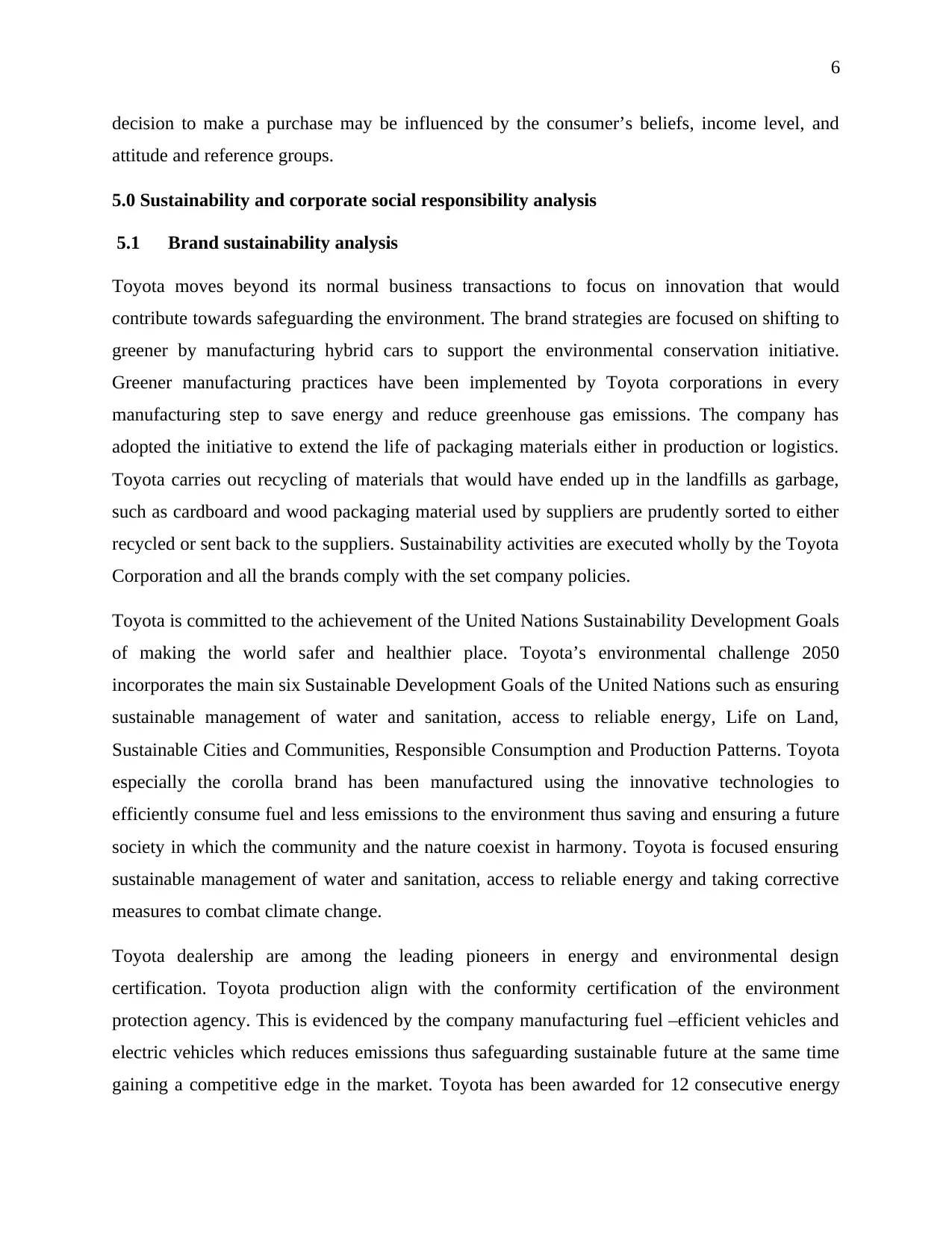
6
decision to make a purchase may be influenced by the consumer’s beliefs, income level, and
attitude and reference groups.
5.0 Sustainability and corporate social responsibility analysis
5.1 Brand sustainability analysis
Toyota moves beyond its normal business transactions to focus on innovation that would
contribute towards safeguarding the environment. The brand strategies are focused on shifting to
greener by manufacturing hybrid cars to support the environmental conservation initiative.
Greener manufacturing practices have been implemented by Toyota corporations in every
manufacturing step to save energy and reduce greenhouse gas emissions. The company has
adopted the initiative to extend the life of packaging materials either in production or logistics.
Toyota carries out recycling of materials that would have ended up in the landfills as garbage,
such as cardboard and wood packaging material used by suppliers are prudently sorted to either
recycled or sent back to the suppliers. Sustainability activities are executed wholly by the Toyota
Corporation and all the brands comply with the set company policies.
Toyota is committed to the achievement of the United Nations Sustainability Development Goals
of making the world safer and healthier place. Toyota’s environmental challenge 2050
incorporates the main six Sustainable Development Goals of the United Nations such as ensuring
sustainable management of water and sanitation, access to reliable energy, Life on Land,
Sustainable Cities and Communities, Responsible Consumption and Production Patterns. Toyota
especially the corolla brand has been manufactured using the innovative technologies to
efficiently consume fuel and less emissions to the environment thus saving and ensuring a future
society in which the community and the nature coexist in harmony. Toyota is focused ensuring
sustainable management of water and sanitation, access to reliable energy and taking corrective
measures to combat climate change.
Toyota dealership are among the leading pioneers in energy and environmental design
certification. Toyota production align with the conformity certification of the environment
protection agency. This is evidenced by the company manufacturing fuel –efficient vehicles and
electric vehicles which reduces emissions thus safeguarding sustainable future at the same time
gaining a competitive edge in the market. Toyota has been awarded for 12 consecutive energy
decision to make a purchase may be influenced by the consumer’s beliefs, income level, and
attitude and reference groups.
5.0 Sustainability and corporate social responsibility analysis
5.1 Brand sustainability analysis
Toyota moves beyond its normal business transactions to focus on innovation that would
contribute towards safeguarding the environment. The brand strategies are focused on shifting to
greener by manufacturing hybrid cars to support the environmental conservation initiative.
Greener manufacturing practices have been implemented by Toyota corporations in every
manufacturing step to save energy and reduce greenhouse gas emissions. The company has
adopted the initiative to extend the life of packaging materials either in production or logistics.
Toyota carries out recycling of materials that would have ended up in the landfills as garbage,
such as cardboard and wood packaging material used by suppliers are prudently sorted to either
recycled or sent back to the suppliers. Sustainability activities are executed wholly by the Toyota
Corporation and all the brands comply with the set company policies.
Toyota is committed to the achievement of the United Nations Sustainability Development Goals
of making the world safer and healthier place. Toyota’s environmental challenge 2050
incorporates the main six Sustainable Development Goals of the United Nations such as ensuring
sustainable management of water and sanitation, access to reliable energy, Life on Land,
Sustainable Cities and Communities, Responsible Consumption and Production Patterns. Toyota
especially the corolla brand has been manufactured using the innovative technologies to
efficiently consume fuel and less emissions to the environment thus saving and ensuring a future
society in which the community and the nature coexist in harmony. Toyota is focused ensuring
sustainable management of water and sanitation, access to reliable energy and taking corrective
measures to combat climate change.
Toyota dealership are among the leading pioneers in energy and environmental design
certification. Toyota production align with the conformity certification of the environment
protection agency. This is evidenced by the company manufacturing fuel –efficient vehicles and
electric vehicles which reduces emissions thus safeguarding sustainable future at the same time
gaining a competitive edge in the market. Toyota has been awarded for 12 consecutive energy
⊘ This is a preview!⊘
Do you want full access?
Subscribe today to unlock all pages.

Trusted by 1+ million students worldwide
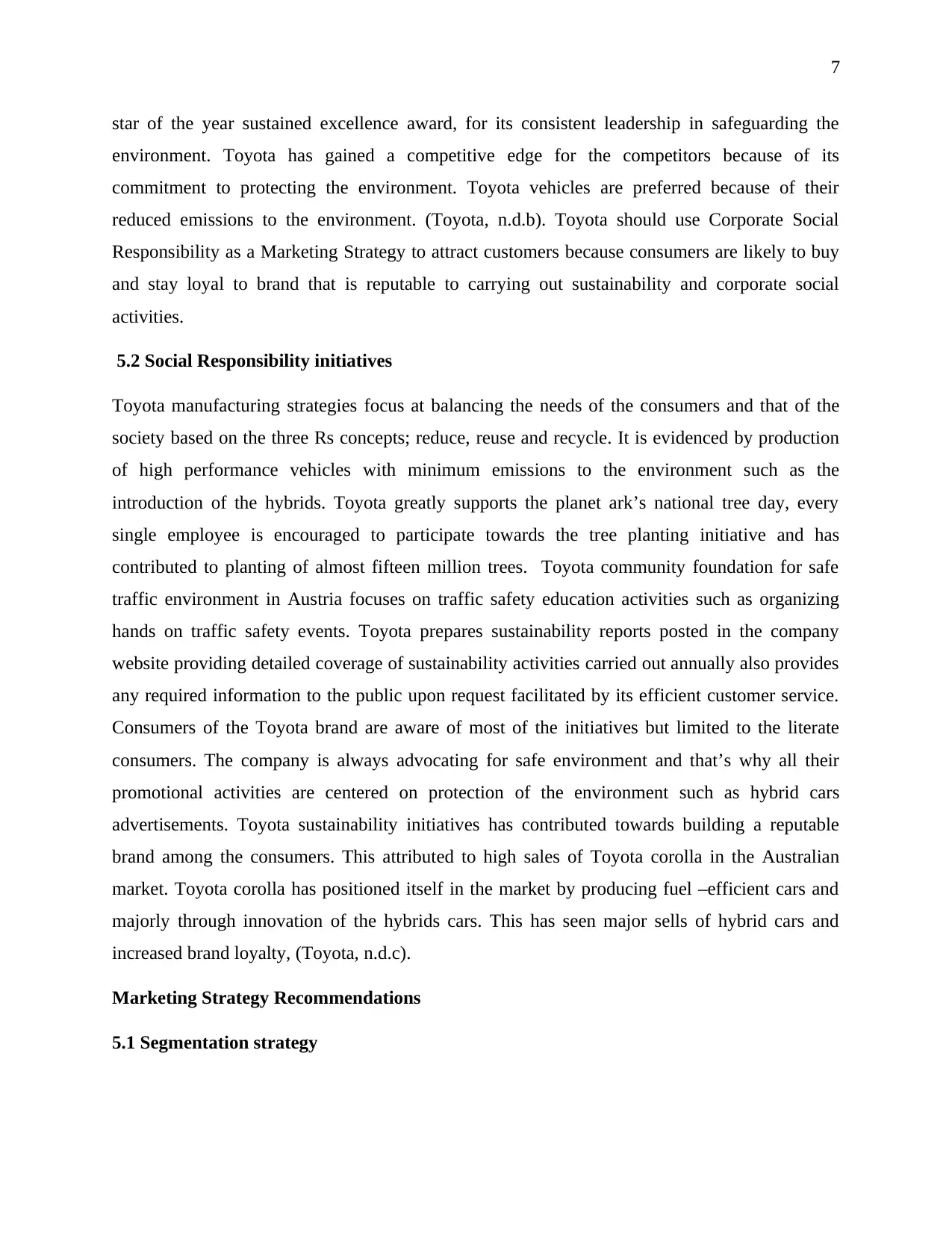
7
star of the year sustained excellence award, for its consistent leadership in safeguarding the
environment. Toyota has gained a competitive edge for the competitors because of its
commitment to protecting the environment. Toyota vehicles are preferred because of their
reduced emissions to the environment. (Toyota, n.d.b). Toyota should use Corporate Social
Responsibility as a Marketing Strategy to attract customers because consumers are likely to buy
and stay loyal to brand that is reputable to carrying out sustainability and corporate social
activities.
5.2 Social Responsibility initiatives
Toyota manufacturing strategies focus at balancing the needs of the consumers and that of the
society based on the three Rs concepts; reduce, reuse and recycle. It is evidenced by production
of high performance vehicles with minimum emissions to the environment such as the
introduction of the hybrids. Toyota greatly supports the planet ark’s national tree day, every
single employee is encouraged to participate towards the tree planting initiative and has
contributed to planting of almost fifteen million trees. Toyota community foundation for safe
traffic environment in Austria focuses on traffic safety education activities such as organizing
hands on traffic safety events. Toyota prepares sustainability reports posted in the company
website providing detailed coverage of sustainability activities carried out annually also provides
any required information to the public upon request facilitated by its efficient customer service.
Consumers of the Toyota brand are aware of most of the initiatives but limited to the literate
consumers. The company is always advocating for safe environment and that’s why all their
promotional activities are centered on protection of the environment such as hybrid cars
advertisements. Toyota sustainability initiatives has contributed towards building a reputable
brand among the consumers. This attributed to high sales of Toyota corolla in the Australian
market. Toyota corolla has positioned itself in the market by producing fuel –efficient cars and
majorly through innovation of the hybrids cars. This has seen major sells of hybrid cars and
increased brand loyalty, (Toyota, n.d.c).
Marketing Strategy Recommendations
5.1 Segmentation strategy
star of the year sustained excellence award, for its consistent leadership in safeguarding the
environment. Toyota has gained a competitive edge for the competitors because of its
commitment to protecting the environment. Toyota vehicles are preferred because of their
reduced emissions to the environment. (Toyota, n.d.b). Toyota should use Corporate Social
Responsibility as a Marketing Strategy to attract customers because consumers are likely to buy
and stay loyal to brand that is reputable to carrying out sustainability and corporate social
activities.
5.2 Social Responsibility initiatives
Toyota manufacturing strategies focus at balancing the needs of the consumers and that of the
society based on the three Rs concepts; reduce, reuse and recycle. It is evidenced by production
of high performance vehicles with minimum emissions to the environment such as the
introduction of the hybrids. Toyota greatly supports the planet ark’s national tree day, every
single employee is encouraged to participate towards the tree planting initiative and has
contributed to planting of almost fifteen million trees. Toyota community foundation for safe
traffic environment in Austria focuses on traffic safety education activities such as organizing
hands on traffic safety events. Toyota prepares sustainability reports posted in the company
website providing detailed coverage of sustainability activities carried out annually also provides
any required information to the public upon request facilitated by its efficient customer service.
Consumers of the Toyota brand are aware of most of the initiatives but limited to the literate
consumers. The company is always advocating for safe environment and that’s why all their
promotional activities are centered on protection of the environment such as hybrid cars
advertisements. Toyota sustainability initiatives has contributed towards building a reputable
brand among the consumers. This attributed to high sales of Toyota corolla in the Australian
market. Toyota corolla has positioned itself in the market by producing fuel –efficient cars and
majorly through innovation of the hybrids cars. This has seen major sells of hybrid cars and
increased brand loyalty, (Toyota, n.d.c).
Marketing Strategy Recommendations
5.1 Segmentation strategy
Paraphrase This Document
Need a fresh take? Get an instant paraphrase of this document with our AI Paraphraser
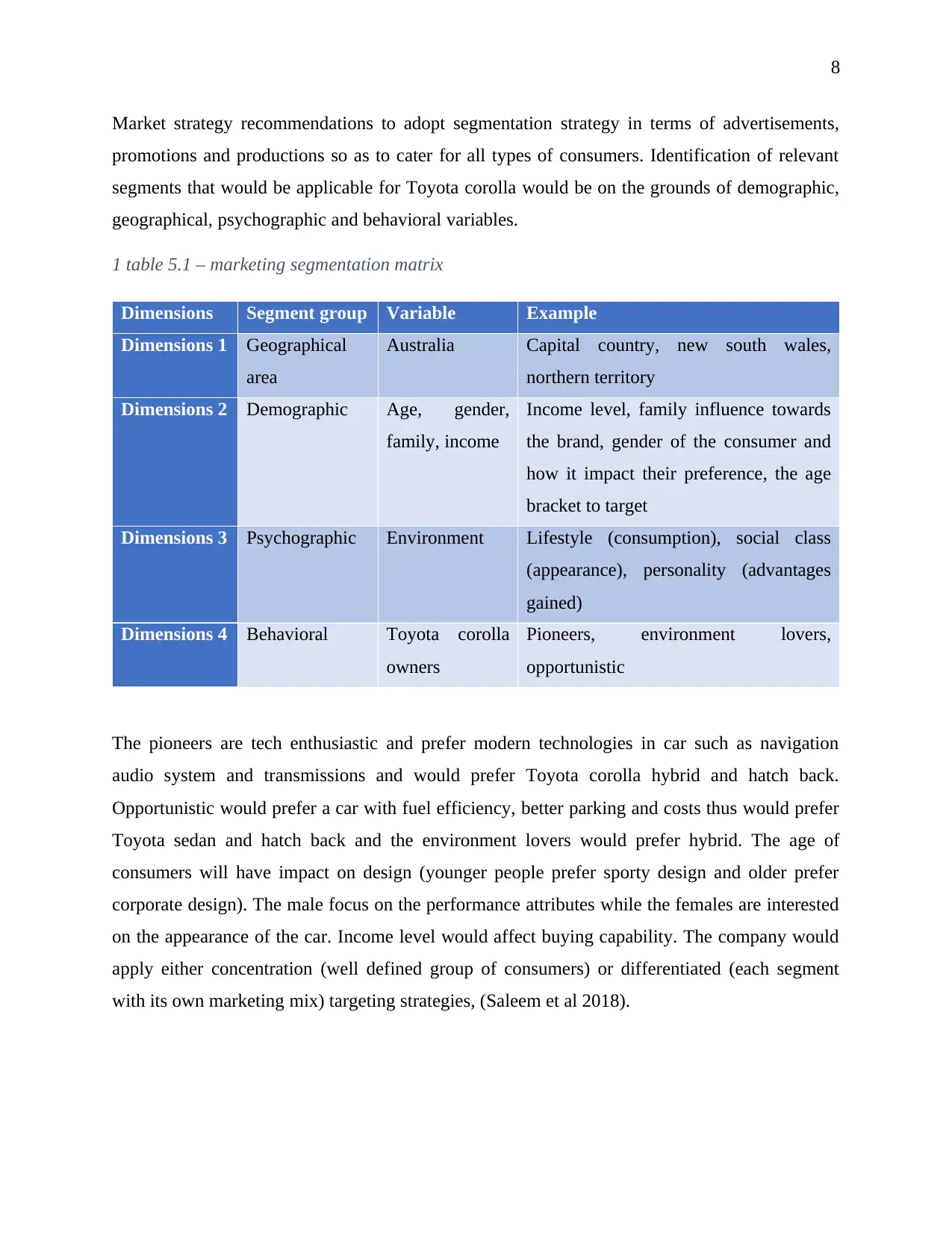
8
Market strategy recommendations to adopt segmentation strategy in terms of advertisements,
promotions and productions so as to cater for all types of consumers. Identification of relevant
segments that would be applicable for Toyota corolla would be on the grounds of demographic,
geographical, psychographic and behavioral variables.
1 table 5.1 – marketing segmentation matrix
Dimensions Segment group Variable Example
Dimensions 1 Geographical
area
Australia Capital country, new south wales,
northern territory
Dimensions 2 Demographic Age, gender,
family, income
Income level, family influence towards
the brand, gender of the consumer and
how it impact their preference, the age
bracket to target
Dimensions 3 Psychographic Environment Lifestyle (consumption), social class
(appearance), personality (advantages
gained)
Dimensions 4 Behavioral Toyota corolla
owners
Pioneers, environment lovers,
opportunistic
The pioneers are tech enthusiastic and prefer modern technologies in car such as navigation
audio system and transmissions and would prefer Toyota corolla hybrid and hatch back.
Opportunistic would prefer a car with fuel efficiency, better parking and costs thus would prefer
Toyota sedan and hatch back and the environment lovers would prefer hybrid. The age of
consumers will have impact on design (younger people prefer sporty design and older prefer
corporate design). The male focus on the performance attributes while the females are interested
on the appearance of the car. Income level would affect buying capability. The company would
apply either concentration (well defined group of consumers) or differentiated (each segment
with its own marketing mix) targeting strategies, (Saleem et al 2018).
Market strategy recommendations to adopt segmentation strategy in terms of advertisements,
promotions and productions so as to cater for all types of consumers. Identification of relevant
segments that would be applicable for Toyota corolla would be on the grounds of demographic,
geographical, psychographic and behavioral variables.
1 table 5.1 – marketing segmentation matrix
Dimensions Segment group Variable Example
Dimensions 1 Geographical
area
Australia Capital country, new south wales,
northern territory
Dimensions 2 Demographic Age, gender,
family, income
Income level, family influence towards
the brand, gender of the consumer and
how it impact their preference, the age
bracket to target
Dimensions 3 Psychographic Environment Lifestyle (consumption), social class
(appearance), personality (advantages
gained)
Dimensions 4 Behavioral Toyota corolla
owners
Pioneers, environment lovers,
opportunistic
The pioneers are tech enthusiastic and prefer modern technologies in car such as navigation
audio system and transmissions and would prefer Toyota corolla hybrid and hatch back.
Opportunistic would prefer a car with fuel efficiency, better parking and costs thus would prefer
Toyota sedan and hatch back and the environment lovers would prefer hybrid. The age of
consumers will have impact on design (younger people prefer sporty design and older prefer
corporate design). The male focus on the performance attributes while the females are interested
on the appearance of the car. Income level would affect buying capability. The company would
apply either concentration (well defined group of consumers) or differentiated (each segment
with its own marketing mix) targeting strategies, (Saleem et al 2018).
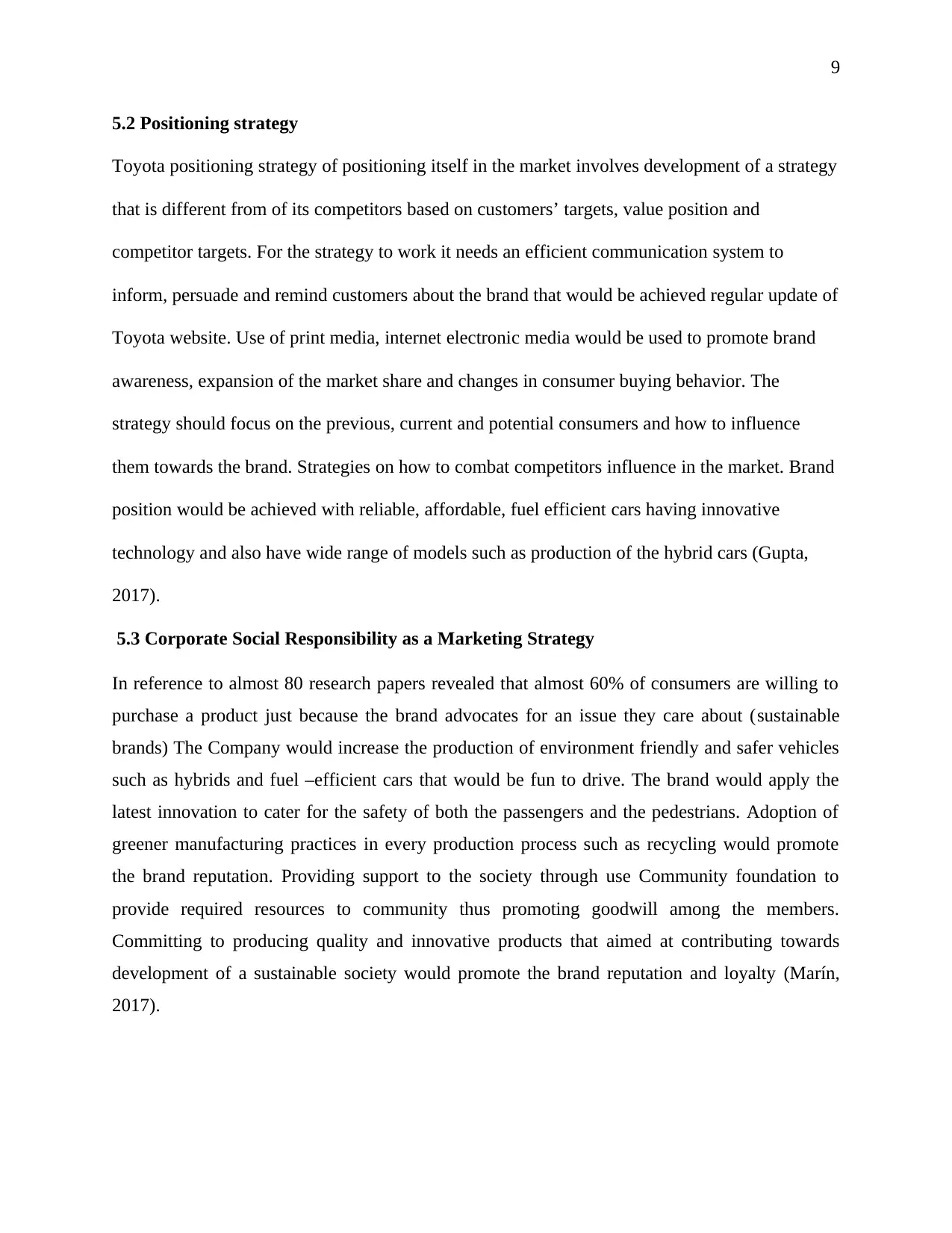
9
5.2 Positioning strategy
Toyota positioning strategy of positioning itself in the market involves development of a strategy
that is different from of its competitors based on customers’ targets, value position and
competitor targets. For the strategy to work it needs an efficient communication system to
inform, persuade and remind customers about the brand that would be achieved regular update of
Toyota website. Use of print media, internet electronic media would be used to promote brand
awareness, expansion of the market share and changes in consumer buying behavior. The
strategy should focus on the previous, current and potential consumers and how to influence
them towards the brand. Strategies on how to combat competitors influence in the market. Brand
position would be achieved with reliable, affordable, fuel efficient cars having innovative
technology and also have wide range of models such as production of the hybrid cars (Gupta,
2017).
5.3 Corporate Social Responsibility as a Marketing Strategy
In reference to almost 80 research papers revealed that almost 60% of consumers are willing to
purchase a product just because the brand advocates for an issue they care about (sustainable
brands) The Company would increase the production of environment friendly and safer vehicles
such as hybrids and fuel –efficient cars that would be fun to drive. The brand would apply the
latest innovation to cater for the safety of both the passengers and the pedestrians. Adoption of
greener manufacturing practices in every production process such as recycling would promote
the brand reputation. Providing support to the society through use Community foundation to
provide required resources to community thus promoting goodwill among the members.
Committing to producing quality and innovative products that aimed at contributing towards
development of a sustainable society would promote the brand reputation and loyalty (Marín,
2017).
5.2 Positioning strategy
Toyota positioning strategy of positioning itself in the market involves development of a strategy
that is different from of its competitors based on customers’ targets, value position and
competitor targets. For the strategy to work it needs an efficient communication system to
inform, persuade and remind customers about the brand that would be achieved regular update of
Toyota website. Use of print media, internet electronic media would be used to promote brand
awareness, expansion of the market share and changes in consumer buying behavior. The
strategy should focus on the previous, current and potential consumers and how to influence
them towards the brand. Strategies on how to combat competitors influence in the market. Brand
position would be achieved with reliable, affordable, fuel efficient cars having innovative
technology and also have wide range of models such as production of the hybrid cars (Gupta,
2017).
5.3 Corporate Social Responsibility as a Marketing Strategy
In reference to almost 80 research papers revealed that almost 60% of consumers are willing to
purchase a product just because the brand advocates for an issue they care about (sustainable
brands) The Company would increase the production of environment friendly and safer vehicles
such as hybrids and fuel –efficient cars that would be fun to drive. The brand would apply the
latest innovation to cater for the safety of both the passengers and the pedestrians. Adoption of
greener manufacturing practices in every production process such as recycling would promote
the brand reputation. Providing support to the society through use Community foundation to
provide required resources to community thus promoting goodwill among the members.
Committing to producing quality and innovative products that aimed at contributing towards
development of a sustainable society would promote the brand reputation and loyalty (Marín,
2017).
⊘ This is a preview!⊘
Do you want full access?
Subscribe today to unlock all pages.

Trusted by 1+ million students worldwide
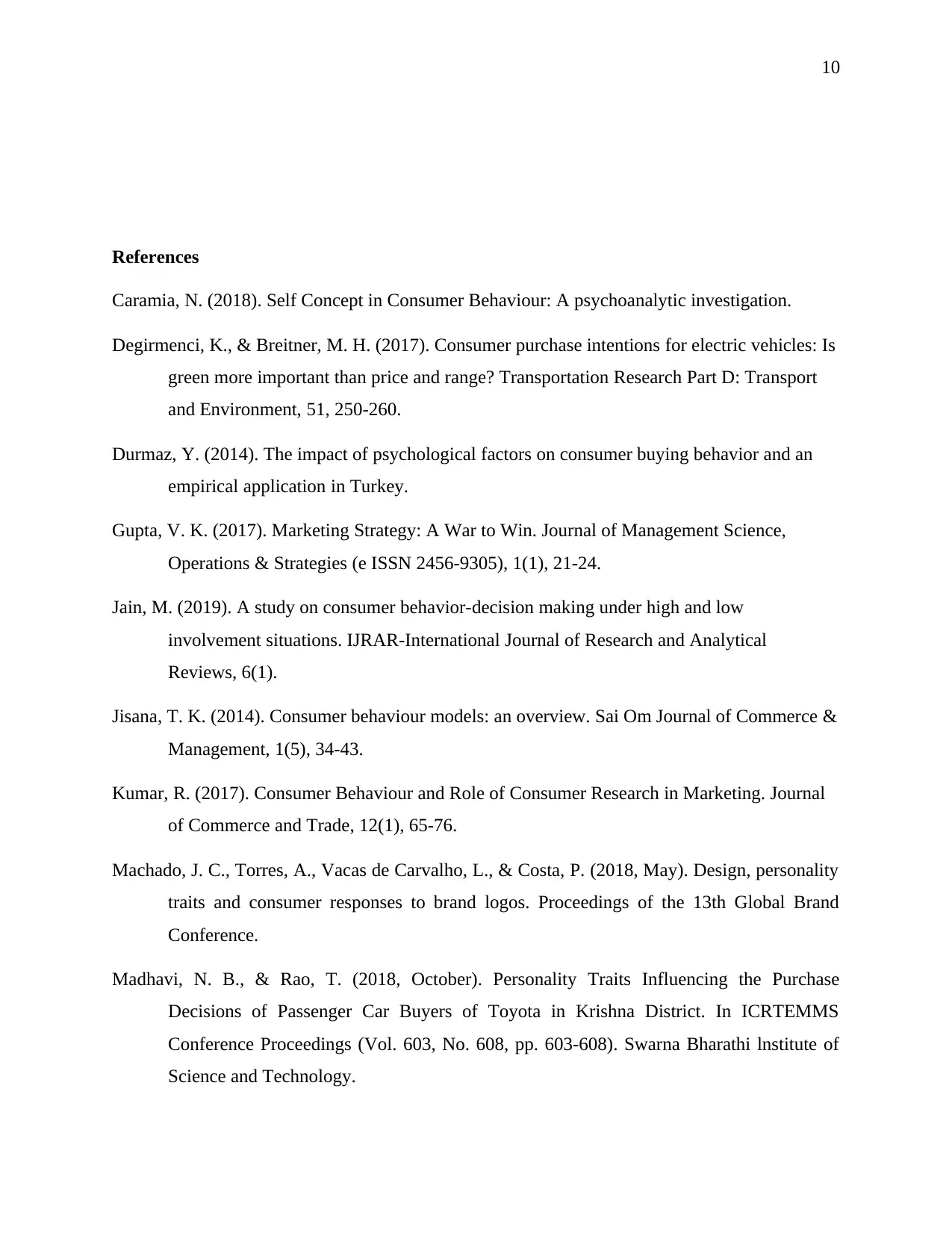
10
References
Caramia, N. (2018). Self Concept in Consumer Behaviour: A psychoanalytic investigation.
Degirmenci, K., & Breitner, M. H. (2017). Consumer purchase intentions for electric vehicles: Is
green more important than price and range? Transportation Research Part D: Transport
and Environment, 51, 250-260.
Durmaz, Y. (2014). The impact of psychological factors on consumer buying behavior and an
empirical application in Turkey.
Gupta, V. K. (2017). Marketing Strategy: A War to Win. Journal of Management Science,
Operations & Strategies (e ISSN 2456-9305), 1(1), 21-24.
Jain, M. (2019). A study on consumer behavior-decision making under high and low
involvement situations. IJRAR-International Journal of Research and Analytical
Reviews, 6(1).
Jisana, T. K. (2014). Consumer behaviour models: an overview. Sai Om Journal of Commerce &
Management, 1(5), 34-43.
Kumar, R. (2017). Consumer Behaviour and Role of Consumer Research in Marketing. Journal
of Commerce and Trade, 12(1), 65-76.
Machado, J. C., Torres, A., Vacas de Carvalho, L., & Costa, P. (2018, May). Design, personality
traits and consumer responses to brand logos. Proceedings of the 13th Global Brand
Conference.
Madhavi, N. B., & Rao, T. (2018, October). Personality Traits Influencing the Purchase
Decisions of Passenger Car Buyers of Toyota in Krishna District. In ICRTEMMS
Conference Proceedings (Vol. 603, No. 608, pp. 603-608). Swarna Bharathi lnstitute of
Science and Technology.
References
Caramia, N. (2018). Self Concept in Consumer Behaviour: A psychoanalytic investigation.
Degirmenci, K., & Breitner, M. H. (2017). Consumer purchase intentions for electric vehicles: Is
green more important than price and range? Transportation Research Part D: Transport
and Environment, 51, 250-260.
Durmaz, Y. (2014). The impact of psychological factors on consumer buying behavior and an
empirical application in Turkey.
Gupta, V. K. (2017). Marketing Strategy: A War to Win. Journal of Management Science,
Operations & Strategies (e ISSN 2456-9305), 1(1), 21-24.
Jain, M. (2019). A study on consumer behavior-decision making under high and low
involvement situations. IJRAR-International Journal of Research and Analytical
Reviews, 6(1).
Jisana, T. K. (2014). Consumer behaviour models: an overview. Sai Om Journal of Commerce &
Management, 1(5), 34-43.
Kumar, R. (2017). Consumer Behaviour and Role of Consumer Research in Marketing. Journal
of Commerce and Trade, 12(1), 65-76.
Machado, J. C., Torres, A., Vacas de Carvalho, L., & Costa, P. (2018, May). Design, personality
traits and consumer responses to brand logos. Proceedings of the 13th Global Brand
Conference.
Madhavi, N. B., & Rao, T. (2018, October). Personality Traits Influencing the Purchase
Decisions of Passenger Car Buyers of Toyota in Krishna District. In ICRTEMMS
Conference Proceedings (Vol. 603, No. 608, pp. 603-608). Swarna Bharathi lnstitute of
Science and Technology.
Paraphrase This Document
Need a fresh take? Get an instant paraphrase of this document with our AI Paraphraser
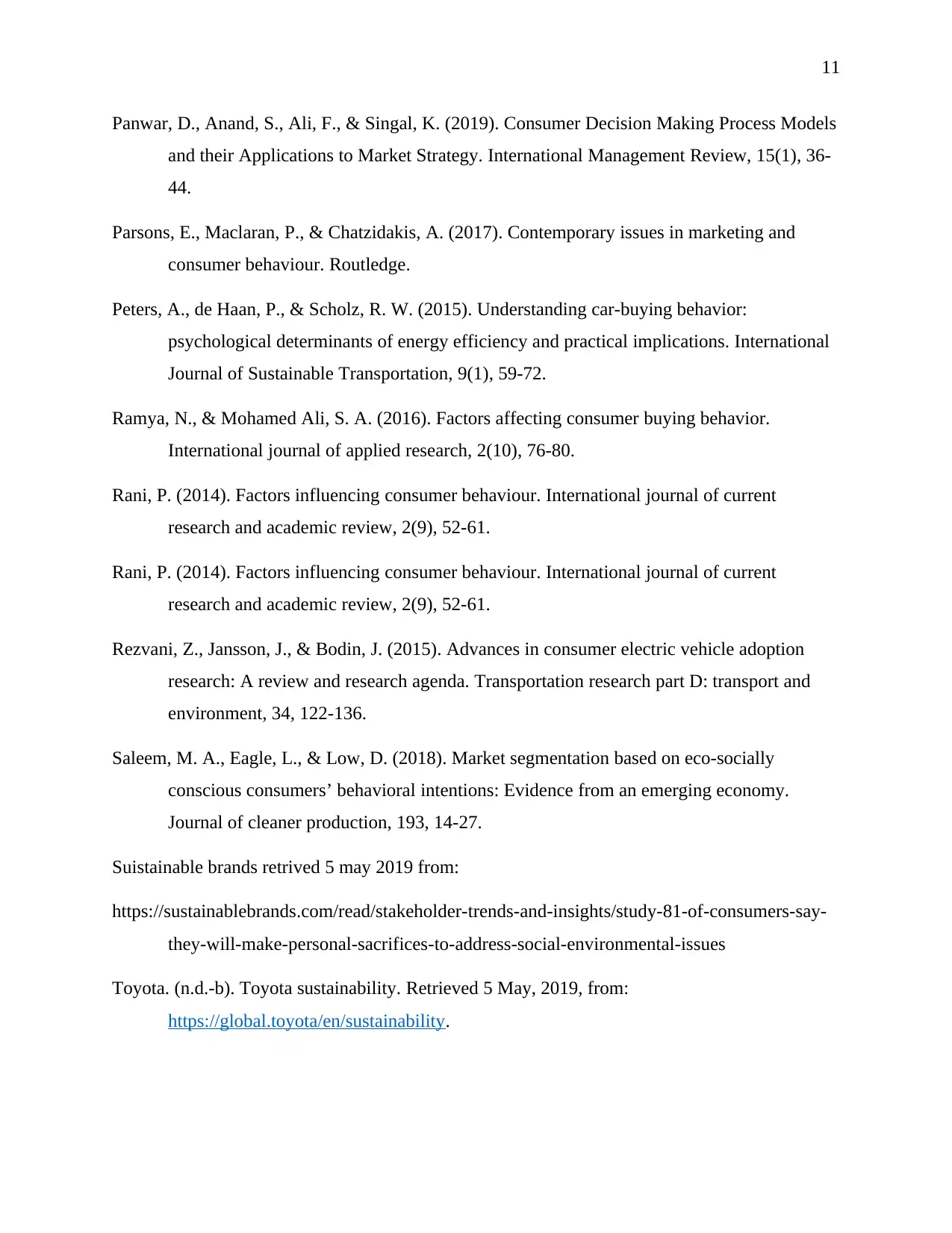
11
Panwar, D., Anand, S., Ali, F., & Singal, K. (2019). Consumer Decision Making Process Models
and their Applications to Market Strategy. International Management Review, 15(1), 36-
44.
Parsons, E., Maclaran, P., & Chatzidakis, A. (2017). Contemporary issues in marketing and
consumer behaviour. Routledge.
Peters, A., de Haan, P., & Scholz, R. W. (2015). Understanding car-buying behavior:
psychological determinants of energy efficiency and practical implications. International
Journal of Sustainable Transportation, 9(1), 59-72.
Ramya, N., & Mohamed Ali, S. A. (2016). Factors affecting consumer buying behavior.
International journal of applied research, 2(10), 76-80.
Rani, P. (2014). Factors influencing consumer behaviour. International journal of current
research and academic review, 2(9), 52-61.
Rani, P. (2014). Factors influencing consumer behaviour. International journal of current
research and academic review, 2(9), 52-61.
Rezvani, Z., Jansson, J., & Bodin, J. (2015). Advances in consumer electric vehicle adoption
research: A review and research agenda. Transportation research part D: transport and
environment, 34, 122-136.
Saleem, M. A., Eagle, L., & Low, D. (2018). Market segmentation based on eco-socially
conscious consumers’ behavioral intentions: Evidence from an emerging economy.
Journal of cleaner production, 193, 14-27.
Suistainable brands retrived 5 may 2019 from:
https://sustainablebrands.com/read/stakeholder-trends-and-insights/study-81-of-consumers-say-
they-will-make-personal-sacrifices-to-address-social-environmental-issues
Toyota. (n.d.-b). Toyota sustainability. Retrieved 5 May, 2019, from:
https://global.toyota/en/sustainability.
Panwar, D., Anand, S., Ali, F., & Singal, K. (2019). Consumer Decision Making Process Models
and their Applications to Market Strategy. International Management Review, 15(1), 36-
44.
Parsons, E., Maclaran, P., & Chatzidakis, A. (2017). Contemporary issues in marketing and
consumer behaviour. Routledge.
Peters, A., de Haan, P., & Scholz, R. W. (2015). Understanding car-buying behavior:
psychological determinants of energy efficiency and practical implications. International
Journal of Sustainable Transportation, 9(1), 59-72.
Ramya, N., & Mohamed Ali, S. A. (2016). Factors affecting consumer buying behavior.
International journal of applied research, 2(10), 76-80.
Rani, P. (2014). Factors influencing consumer behaviour. International journal of current
research and academic review, 2(9), 52-61.
Rani, P. (2014). Factors influencing consumer behaviour. International journal of current
research and academic review, 2(9), 52-61.
Rezvani, Z., Jansson, J., & Bodin, J. (2015). Advances in consumer electric vehicle adoption
research: A review and research agenda. Transportation research part D: transport and
environment, 34, 122-136.
Saleem, M. A., Eagle, L., & Low, D. (2018). Market segmentation based on eco-socially
conscious consumers’ behavioral intentions: Evidence from an emerging economy.
Journal of cleaner production, 193, 14-27.
Suistainable brands retrived 5 may 2019 from:
https://sustainablebrands.com/read/stakeholder-trends-and-insights/study-81-of-consumers-say-
they-will-make-personal-sacrifices-to-address-social-environmental-issues
Toyota. (n.d.-b). Toyota sustainability. Retrieved 5 May, 2019, from:
https://global.toyota/en/sustainability.
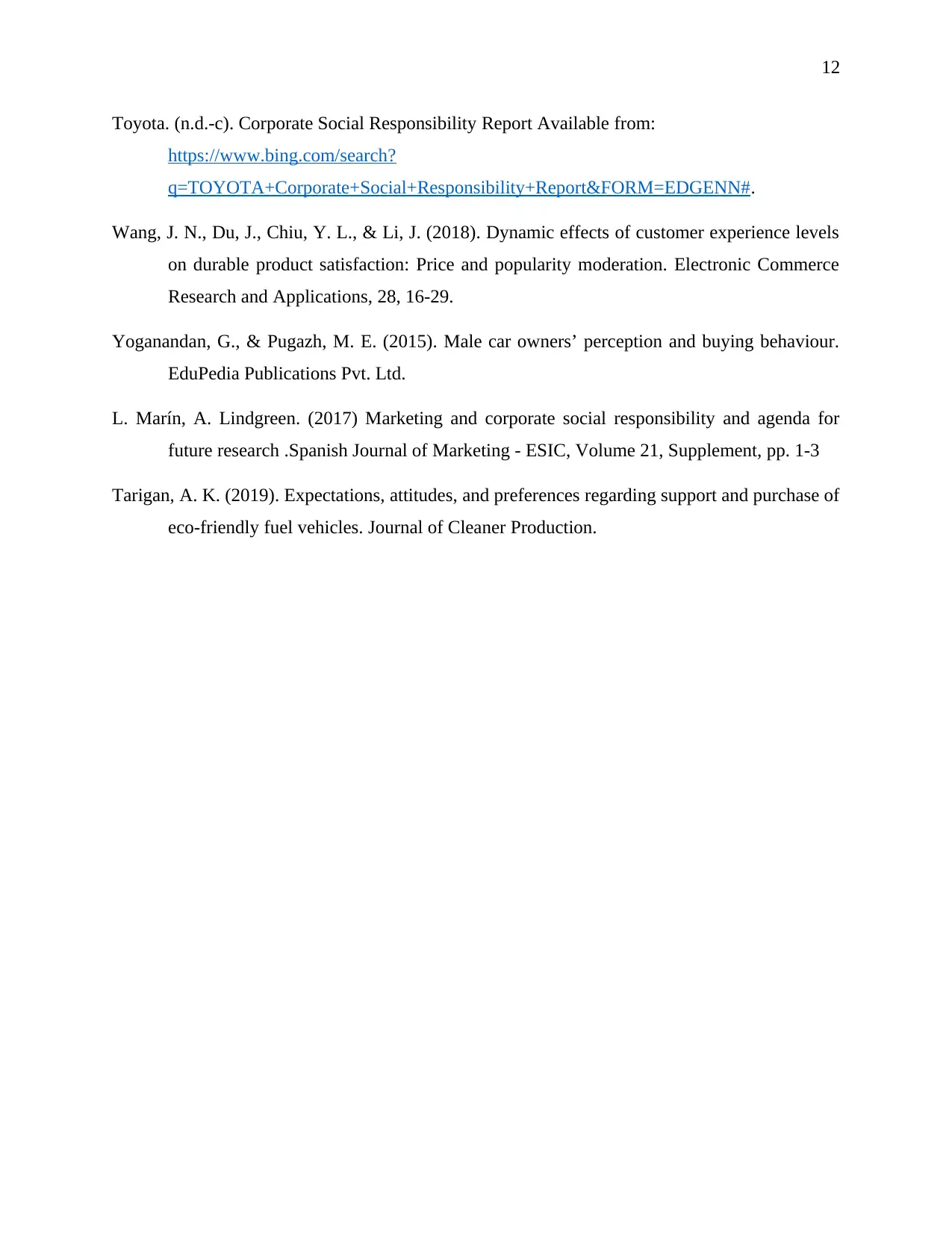
12
Toyota. (n.d.-c). Corporate Social Responsibility Report Available from:
https://www.bing.com/search?
q=TOYOTA+Corporate+Social+Responsibility+Report&FORM=EDGENN#.
Wang, J. N., Du, J., Chiu, Y. L., & Li, J. (2018). Dynamic effects of customer experience levels
on durable product satisfaction: Price and popularity moderation. Electronic Commerce
Research and Applications, 28, 16-29.
Yoganandan, G., & Pugazh, M. E. (2015). Male car owners’ perception and buying behaviour.
EduPedia Publications Pvt. Ltd.
L. Marín, A. Lindgreen. (2017) Marketing and corporate social responsibility and agenda for
future research .Spanish Journal of Marketing - ESIC, Volume 21, Supplement, pp. 1-3
Tarigan, A. K. (2019). Expectations, attitudes, and preferences regarding support and purchase of
eco-friendly fuel vehicles. Journal of Cleaner Production.
Toyota. (n.d.-c). Corporate Social Responsibility Report Available from:
https://www.bing.com/search?
q=TOYOTA+Corporate+Social+Responsibility+Report&FORM=EDGENN#.
Wang, J. N., Du, J., Chiu, Y. L., & Li, J. (2018). Dynamic effects of customer experience levels
on durable product satisfaction: Price and popularity moderation. Electronic Commerce
Research and Applications, 28, 16-29.
Yoganandan, G., & Pugazh, M. E. (2015). Male car owners’ perception and buying behaviour.
EduPedia Publications Pvt. Ltd.
L. Marín, A. Lindgreen. (2017) Marketing and corporate social responsibility and agenda for
future research .Spanish Journal of Marketing - ESIC, Volume 21, Supplement, pp. 1-3
Tarigan, A. K. (2019). Expectations, attitudes, and preferences regarding support and purchase of
eco-friendly fuel vehicles. Journal of Cleaner Production.
⊘ This is a preview!⊘
Do you want full access?
Subscribe today to unlock all pages.

Trusted by 1+ million students worldwide
1 out of 12
Related Documents
Your All-in-One AI-Powered Toolkit for Academic Success.
+13062052269
info@desklib.com
Available 24*7 on WhatsApp / Email
![[object Object]](/_next/static/media/star-bottom.7253800d.svg)
Unlock your academic potential
Copyright © 2020–2026 A2Z Services. All Rights Reserved. Developed and managed by ZUCOL.



